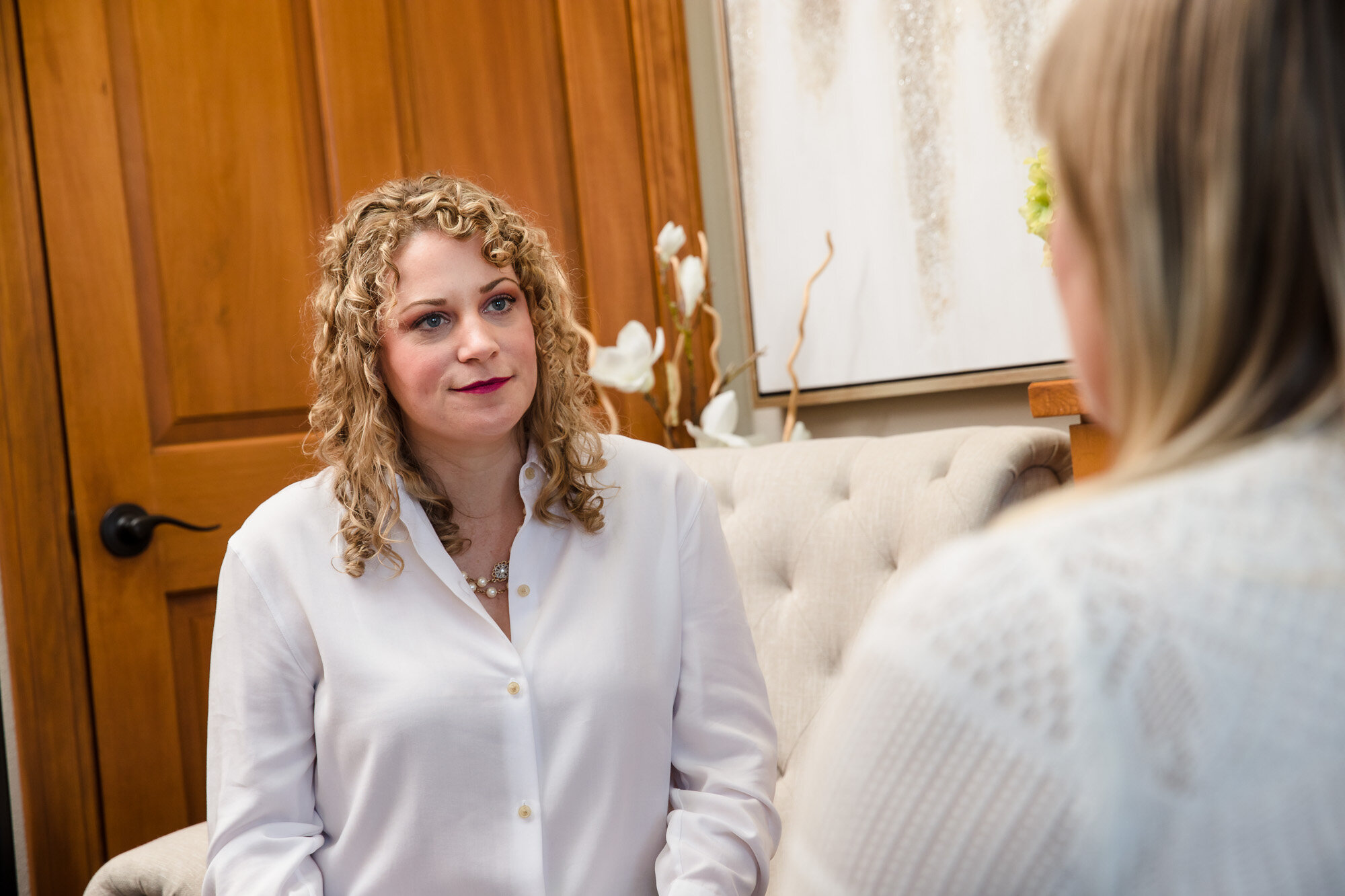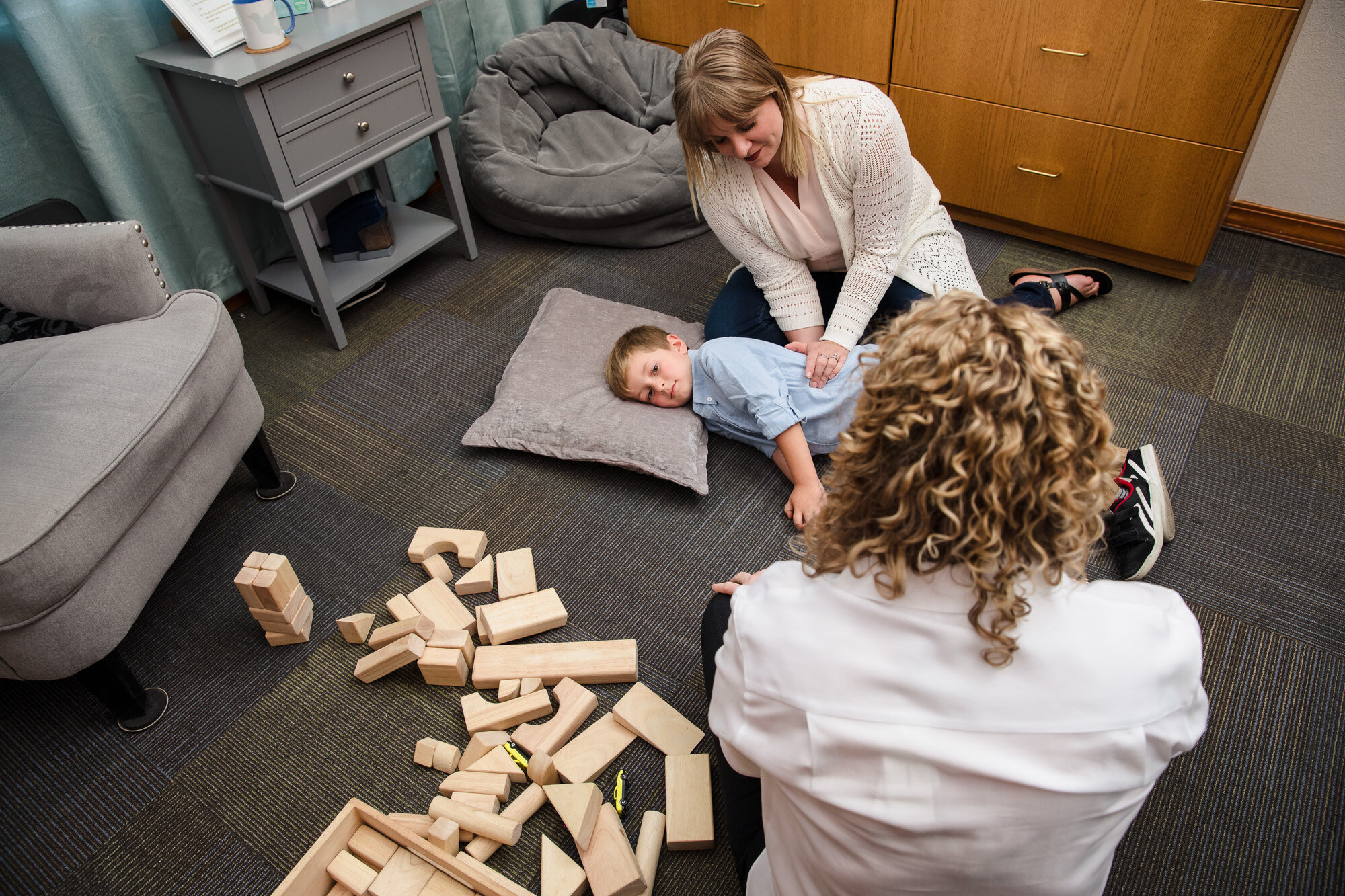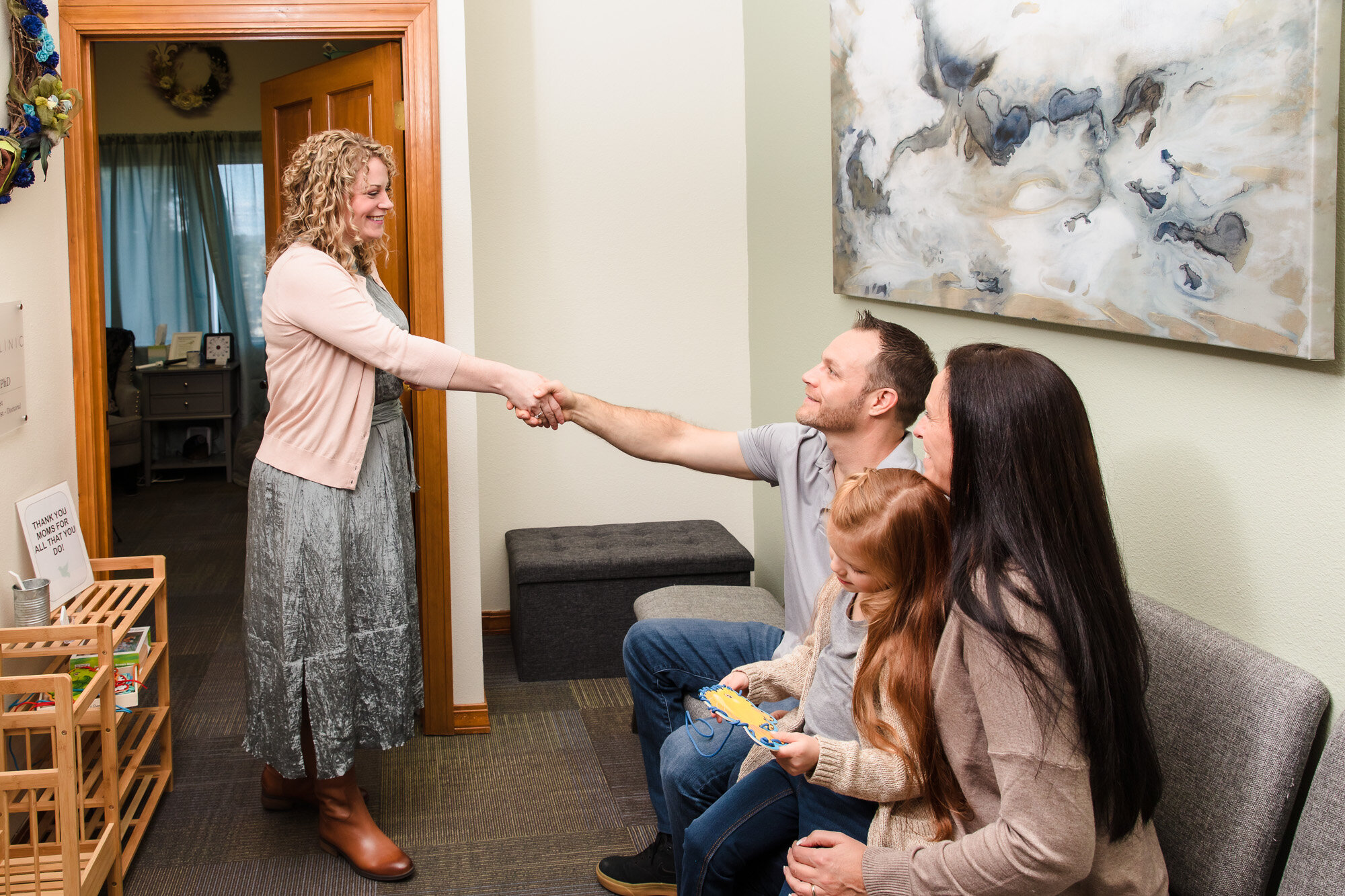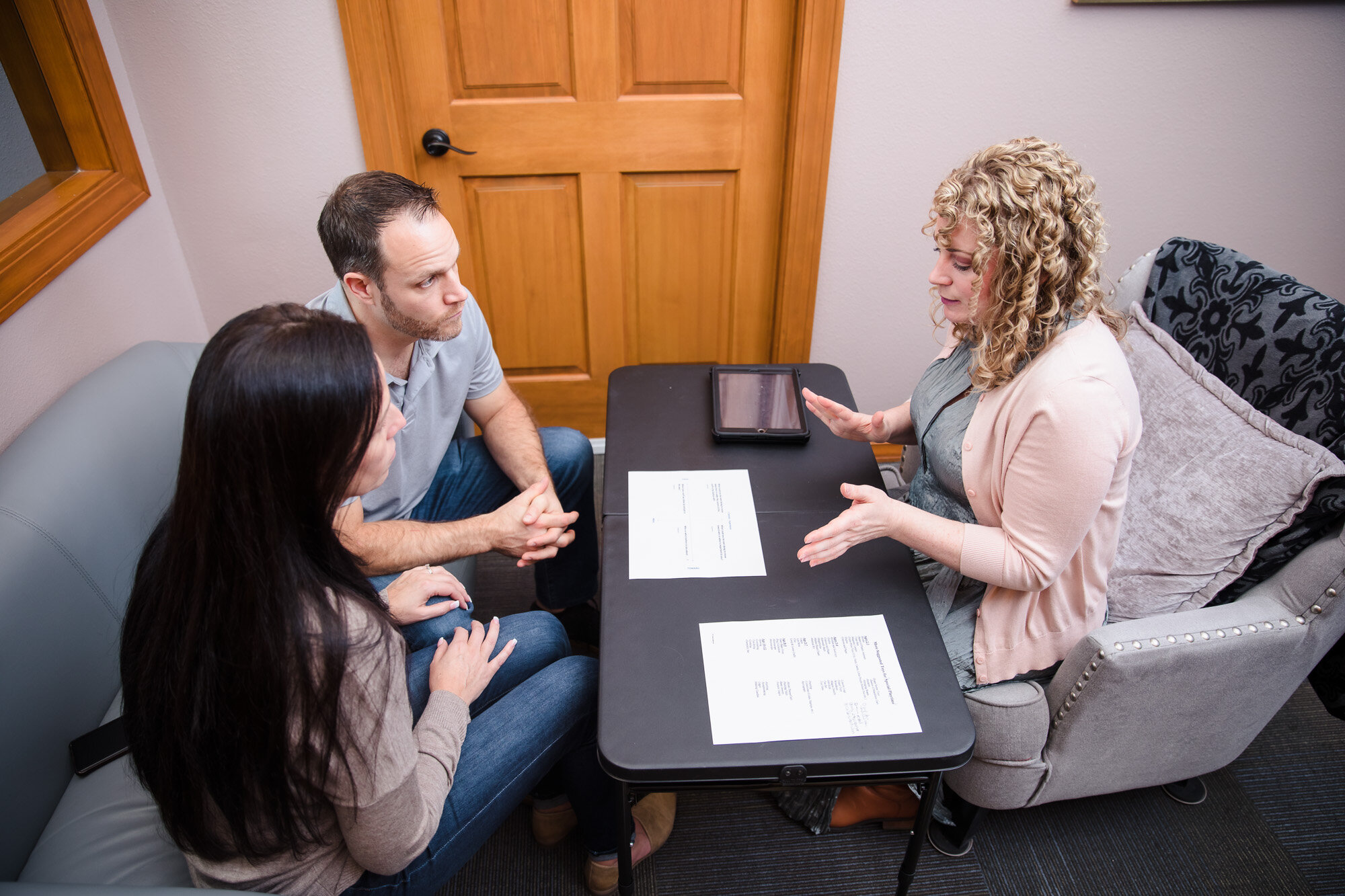Today we are talking about alternative treatments for supporting your child's behavior. Alternative treatments might be things like essential oils, elimination diets, using the moon to decide when you will go out for fun activities versus hunkering down in anticipation of naughty behavior, and other types of old wives tales and Instagram / Pinterest wisdom that is not necessarily linked to evidence-based studies. Many providers, including physicians, psychologists, therapist, and others, get this question all the time. It's a very important question because it frames the way that you as a parent will approach treatment for your child and the energy and attributions you give to interventions along your child's journey.
Read MoreWhy doesn't my child listen to me?
I'm sharing a parent question and answer video I made from my new Facebook group, Positive Parenting Q and A, today.
Today's video focuses on understanding why a child might be responsive and compliant with one parent and not with the other parent and how I address it in therapy. This is a very COMMON question!
I discuss three big reasons for this phenomenon. I also discuss how I approach healing the parent-child relationship to…
A psychologist mom uses mindfulness to teach emotion regulation to her autistic kid
Today I'm chatting with Dr. Rubia Subhani. She is a psychologist practicing in Georgia and also a parent to an autistic child. Across her professional and personal journey she has developed a mindfulness practice to help her child manage anxiety and behavior flare ups.
Read MoreUsing a Calm Down Toolkit
To start off the new year we're chatting with Trina Deboree, an elementary school Media Specialist focused on standards-based reading materials and science/STEM/makerspace. She helps teachers and parents create engaging materials that help foster the love of learning in children.
Read MoreGiftedness and Special Needs
I'm chatting today with a psychologist who specializes in giftedness, Andrea Lein. She and I really nerded out... for a while. We talk about what giftedness is, what twice exceptional is (when a gifted personal has a learning or emotional disability in school), and how parents can approach supporting twice exceptional children. Enjoy!! (I know we did!)
Read MoreHow to do breathing and mindfulness | Working with a physical/yoga therapist and psychologist
Meet Jen Wilking! She is a physical therapist and yoga therapist who has honed in on helping people to learn how to relax their mind and body. In this video she teaches us how to breathe properly, and then we do a live demonstration of a 5-minute mindfulness practice. We discuss how breathing correctly and mindfulness can change your stress level and how parents can
Read MoreChild Stuttering and Anxiety | Chatting with an SLP
I'm discussing child stuttering and the often observed anxiety in children today with speech-language pathologist, Kelly Clendaniel, MS, CCC-SLP. Kelly has a special interest in stuttering as well as a child who stutters. She provides up-to-date information on what parents and providers should know about stuttering. I then jump in with information about how anxiety and anxiety disorders develop and are maintained. Anxiety is increasingly understood to be…
Read MoreToddler Sleep... Get you some!
We're discussing toddler sleep!! This is a dreamy topic for many parents out there. Our expert this week is Erica Harren who is a Board Certified Behavior Analyst, or BCBA, and mom of a toddler.
Read MoreCoparenting Therapy
I'm chatting with clinical psychologist, Tiffany Rochester, in Perth, Australia. She specializes in coparenting therapy for divorced and separated parents who aim to work together for the betterment of their child(ren). We discuss what coparenting means, the mindset of providers and parents in effective and ineffective coparenting therapy, the role of the legal system, and common themes of emotions that children display. Many parents have described to me that they feel they're coparenting with
Read MoreWhat is clinical behavior analysis?
I'm chatting with Dr. Ben Kennert, licensed psychologist in Michigan and Board Certified Behavior Analyst. We're discussing Clinical Behavior Analysis. It entails several different therapy modalities, including my favorites ACT and PCIT. This is a great conversation for those in the counseling or ABA fields looking to understand the concepts and how clinical behavior analysis is used. It is used very differently than ABA, so be prepared for differences.
Read MoreABA Therapy | Chatting with Traditional Applied Behavior Analysis Therapists
I'm chatting with the owners of Pacific Northwest Behavior, a Spokane, WA based ABA provider to young children with autism and other developmental difficulties. Kourtney and Steve are BCBAs, and we chat about the important ethical considerations of using ABA to honor autistic people's independence while also helping them to gain more independence.
We dive into differential reinforcement and how parents are likely to encounter this behavioral principal with any child on a typical day.
Read MoreHow to Teach Your Child to Have a Healthy Relationship with Food (and to Eat Well)
I'm chatting with Michelle Winebender, a Registered Dietitian and Nutritionist for over 25 years (and a good friend of mine). We chat about how to create healthy eating habits in young children so that they grow up to have a good relationship with food. Michelle helps with the super common questions I get "Is my kid eating enough?" and "Will my child get a nutrient deficit if I can't get them to eat more variety?"
Read MoreCouple's Counseling and How It Can Help with Parenting
Dr. Blevins is continuing her expert chats this week with Billie Tyler, MS, LMFT out of Spokane, WA who specializes in relationship counseling. She uses the Gottman approach, Emotion Focused Therapy, and Solution Focused Therapy as her orientations. Our conversation includes an overview of what couple's therapy is and the way it can help parents to reach their parenting goals. They discuss how relationship therapy may come on the radar for parents, what some common difficulties are that Billie sees, and the benefits of establishing healthy communication early in any relationship. You can learn more about Billie Tyler, MS, LMFT at https://billietylertherapy.com.
Read MoreRelaxing Your Body | Managing Stress
If you're like me, you've been a bit more stressed recently. It's hard not to be. On top of normal everyday life stress, we're having a pandemic and a long awaited social awakening to systemic racism.
It's hard to be present and feel 100% everyday. So, I wanted to share how I'm taking care of myself. I'm specifically going to focus on mindfulness and body awareness. They go hand-in-hand, of course. And if you feel this is a little woo woo of a topic, just hold on through the next paragraph...
Psychiatrist Bessel Van Der Kolk, M.D. wrote a New York Times Best Seller on trauma and the body, The Body Keeps the Score, that went into amazing detail about how our bodies hold the scars of emotional, verbal, and systemic trauma (in addition to physical trauma of course) through dysregulation of our fight or flight or freeze response. In the short term this can lead to poor sleep, digestive distress, and irritability. But, the long term consequences can be devastating. The ACEs Study found that chronic diseases, like hypertension, alcoholism, depression, drug abuse, eating disorders, obesity, and other poor future behaviors and outcomes, like high-risk sexual behaviors, smoking, and suicide and more likely to occur in adulthood with increased risk factors in childhood, including multiple forms of trauma. See ACEs Info here.
When I work with a child, I always consider …
Restrictive and Repetitive Behaviors in High Functioning ASD
This week's learning video discusses restrictive and repetitive behaviors (RRBs) as they are sometimes seen in high functioning (HFA) individuals with Autism Spectrum Disorder (ASD).
I often see, and many psychologists describe, that children and adults who have reached a higher level of adaptive functioning, or higher cognitive (thinking) skills level, will present differently than a moderately or low functioning person with ASD. First I'll provide some context for how I most often have seen HFA in my private practice among young children and when evaluating a range of ages up through adulthood.
A person with HFA can better compensate because …
Building Routines and Habits During Summer
It's finally summer!! The stress of homeschooling is over. The governor in Washington just announced that schools will be taking students in for a physical open in the fall. Ahhhh!!!
You deserve a break! You've worked hard doing multiple jobs for 3 months straight. Go ahead and plan that getaway!!
Today's learning topic is for when you come back rejuvenated from break and the kids are settling into their summer routine. Just before they start in with the "I'm bored" statements. Today's topic is about reducing kid frustration and increasing their cooperativeness through environmental arrangement.
Specifically, environmental arrangement is …
Last Week of School | Reflection Activity
You did it!!!
I hope your summer is filled with sun, warmth, and fun. You deserve it!
Before you get started, I want to encourage you to take a few minutes to reflect with your child on how you two (three, four...) worked together these last few months. I have a fun, coloring activity for you to help!
Why?! Because you've stretched yourself and grown so much. It's worth seeing how you've filled those little spaces and accommodated a whole new career (being a teacher!) while still doing all the many other duties of being a parent. I imagine your patience, skill in organizing and prioritizing, and communication have grown. I work with many perfectionistic parents... how did that attribute take a hit these last few months? Are you way more flexible now?
It's important to celebrate your own growth, and to really recognize the skills and resources you used to pull off these last few months. It's important that your child recognize it in themselves and you too. I bet they learned some things about how their brain learns. Many children I know have learned they need to get up and move more than they ever did at school. And they learn better because of it. Did your child learn how to manage their time and to interrupt you less? Maybe that's something they're still working on?? Or, maybe they learned that Mommy does really important things at her job. Or that she helps little brother too, so it's important to wait.
Too often I see parents rush into the next phase of life right after the last hurdle. This creates a sense of always trying to tread water. Pausing for reflection on our strengths and how we've grown helps us to mark the time, joy, achievement, giving us a sense of calm and satisfaction. Additionally this school year, many school celebrations have been cancelled or disrupted. So, yes, you are so key and important to helping your child with this step.
Watch the video for detailed instructions on the coloring activity, and Celebrate!!
Warmly,
Dr. Blevins
Children's Language: An Overview of IQ and Adaptive Skills
Today's video hits on a common theme of concerns I get from parents of young children: language.
Young children can have problem behavior for a variety of reasons, but a common one is poor language development. It is always something I assess when I have a child (of any age) come in for evaluation.
The reason is that poor language skills lead kids to
1) misunderstand what has happened (leading to perceptions of lying),
2) misunderstand what they're told to do (leading to poor compliance),
3) poor articulation (leading to frustration and acting out), and
4) poor expressive productivity (leading to lower self-advocacy skills). These are just a few of the ways language can impact a child.
Every child is unique, and a comprehensive evaluation that includes your child's pediatrician's input and a speech-language pathologist's assessment is the best course to figure out what's going on and how to support your little one.
While language may be one root cause of behavior problems, it is one of many treatment approaches. We can provide interventions beyond increasing language. Other goals include emotion regulation, recognizing cues that signal the child's own needs, and changing stressful environmental situations to be more developmentally helpful.
Warm regards,
Dr. Blevins
Things on My Mind | Therapy for Kids
In today's video I am answering some of the questions I get from time to time from parents. I'm also chatting about some of the things that I find there to be confusion about regarding this weird time of stay-at-home orders.
The big take away is that there is still behavioral health support available to you, your child, and family. Just reach out to your preferred provider or PCP to figure out exactly what kind of services you may need and how to most safely access those services.
I, and many of my colleagues, have made note of the increased stress that parents and kids are experiencing recently. And daily stress can take it's toll.
You and your family deserve to have support and tools to manage that stress as best as you can. Even if you wouldn't say it's a "problem," you can still pick up some tools to feel better equipped with the day-to-day grind that is so hard for so many people right now. Whether you want a one- or two-session consult or traditional therapy that leads to big transformation of a more prominent difficulty, the behavioral health workforce is up and running!
I'm still feeling so inspired by the compassion that our world is showing to each other during the pandemic. Remember that self-compassion and refueling your tank will allow you to continuing being the rock star that you are!
Warmly,
Dr. Blevins
Grief in Young Children
I've been wanting to get to today's topic for a bit now. Given the pandemic, I've felt that grief (unfortunately) is a timely topic for families these days. Even if your family isn't touched by grief due to the pandemic, it doesn't hurt to be aware of how grief affects children. It's good info to sock away if ever, God forbid, you need to know it.
A disclaimer about the info in today's video: it reflects my review of the literature, which focuses on children's grief of close family members. If your child experiences grief of a more distant family member or friend, watches your personal grief of a lost one, or experienced a related loss (like the death of a pet) they may experience different or varied signs of grief from what I discuss in this video. This video does not go into aberrant or complex reactions to grief. If you ever have concerns, please contact your child's pediatrician.
Grief is a healthy part of the human experience. It tells us that we cared for and loved the lost one. Young children experience grief too because they love too. However, they have less developed language skills, more concrete thinking capacities, and learn how to understand experiences from watching those around them. This video discusses how that makes children's grief look different than adults.
If you're going through grief, this video may be hard to watch. I encourage you to skip it if you need to, watch it with a supportive person, or to seek your own supportive professional to interpret how you can best take care of yourself and any young children who may be grieving too.
Take care,
Dr. Blevins






